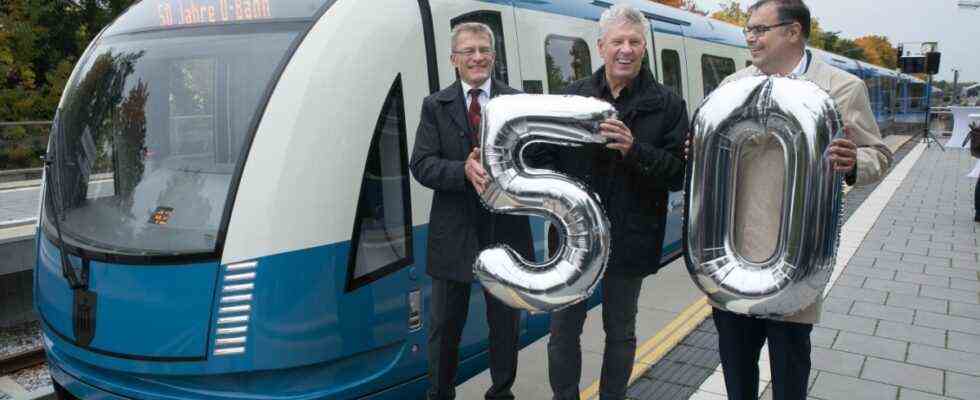Actually, they would have celebrated such a moment with dignity. With a big celebration, buffet – and at least with a priest and a brass band. But in times of Corona it just has to be enough to celebrate the 50th birthday of the Munich subway in a more modest setting. On October 19, 1971, the first underground line between Goetheplatz and Kieferngarten went into operation with great fanfare and 1,600 invited guests. For the anniversary on Tuesday, there were still butter pretzels and sausage rolls for the journalists and the few invited guests who are directly or indirectly related to the Munich Transport Company (MVG). In addition, the MVG presented one of two anniversary trains, which are a new model of the C2 type, but come in the white and blue of the old trains. The original train from the opening run no longer exists. This was scrapped in May of this year.
Lord Mayor Dieter Reiter (SPD) was there as a speaker at the Kieferngarten subway station, MVG boss Ingo Wortmann and the head of the Bavarian Ministry of Transport, Helmut Schütz. Reiter once again used the semi-public celebration to demand more money for public transport from the federal and state governments. At first he joked in view of the outdated subway fleet with many vehicles of the very first generation: “We are extremely sustainable in Munich.”
It took just seven and a half years until the first subway, including the planning and construction time, was ready – a period that Reiter would still wish for today. That is how long, he criticized, that the planning approval process, i.e. the building permit process, takes today. Reiter turned to federal politics, saying there was no need for “Sunday speeches” on public transport, “we also need money”. If nothing changes in the subsidies, it will not be possible to build a single new subway in Munich. “Nothing going on without moss,” says Reiter. The annual federal funds to finance the expansion of public transport currently amount to one billion euros for the whole of Germany. The planned underground projects in Munich alone, such as the U9 or extensions of existing lines, would cost six to eight billion, according to Reiter. He also called for the approval process to be accelerated.
Helmut Schütz and Ingo Wortmann spoke out in favor of changing the funding rules based on the so-called standardized assessment, according to which only projects with a cost-benefit factor higher than one are currently eligible for funding. For the U9, the cost of which is currently estimated at 3.5 billion euros, this would not be the case at the moment. His colleague in Vienna once stated that he could not have built a kilometer of underground if these rules also existed in Austria, said Wortmann. The MVG boss also asked for more money to finance new vehicles and the maintenance of the aging network. Every year the MVG has to renew an average of 13 switches and six kilometers of rails.

